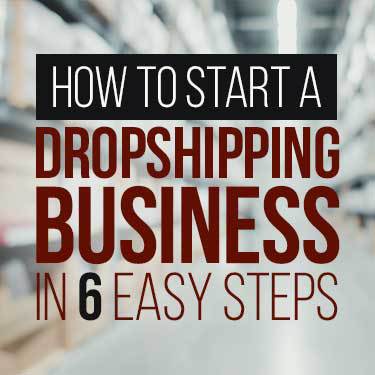
 Copy URL to Clipboard
Copy URL to Clipboard
Maybe you’ve heard that there are people in the world making money doing something called dropshipping and now you have a very important question of how to set up dropshipping as your main business or even as a lucrative part-time endeavor.
To start a dropshipping business, you'll need to follow 6 simple steps:
Each step is vital to the overall process and has important details that can't be overlooked. Our comprehensive guide takes a close look at each step to give you a full picture of how to start a dropshipping business.
Table of Contents
So you’re looking to start your own dropshipping business from scratch and are looking for the simplest, most straightforward path of how to set up dropshipping. So before we barrel into the steps needed to have a successful dropshipping enterprise, let’s really define what dropshipping is and how it benefits both you and the customers you’ll be providing this service for.
Dropshipping is the practice of buying goods wholesale from a vendor, but having that same vendor fill the order and ship it on your behalf. In this setup, you make the difference between what the items cost and what consumers purchase them for. So a dropshipping operation never actually has the goods in its possession nor is it ever the one responsible for fulfilling and sending the order.
A quick example of this is finding wholesale items to buy on AliExpress (for instance) at low prices. Then you create a listing on another marketplace like eBay or Amazon and sell the items there. You’d then place the order on AliExpress, who’d send the items to the customer. Where the dropshipper profits is the difference in cost between those two items. Depending on how high the disparity is between those two prices, dropshipping can be quite lucrative.
You can also start up a dropshipping business with very little upfront cost, which also makes it attractive. But you might ask yourself what is in it for everyone involved? Well here’s a quick breakdown:
Now that dropshipping has been clearly defined, let’s talk about the simple steps that need to be taken in order to start such a business.
Looking at alternatives? Check out our article on Amazon FBA vs. Dropshipping.

This one might be the most simple step of all — you need to decide what you plan on selling. While knowing you have to do this is the easy part, the process that goes into doing it is a bit more complicated. Just saying you’re going to sell, for example, flashlights sounds like a breeze but you need to factor in the following things when you find products to potentially sell:
If the answer to this question is not yes, then you’re probably targeting the wrong product to sell. Because if you can’t answer yes to this, then little else matters. This is a good opportunity to look for ways to maximize your profits. As an example, if selling a $10 item takes the same amount of work as a $1,000 product with a much higher profit margin built, you should consider the latter if possible. Of course, there must be a market for a good with a high price, but your goal should be to work smarter, not harder.
If you’re selling an item for $15 but shipping costs you $5, that might be too great of a cost for you to actually turn a profit. There are a few things you can do to bring the cost of shipping products down:
You can use Google to determine if people are even searching for what you plan to sell. This might seem like a silly thing to have to sit down and consider but the last thing you want as a dropshipper is to be sitting around taking little to no orders and — even worse — not having any answer as to why. Establishing a conservative estimate on what you expect to be able to sell at the onset is important to both manage expectations and also see if it appears that the products you picked will be worth offering long-term.
This will also involve sitting down at a computer and using Google Trends to look for search terms that consumers are using in order to search for the type of products you’re thinking about selling.
If you lived in a small town where 10 other businesses sold strawberries, that would understandably not be your first choice. So here, you need to at least make sure you’re not selling things that are readily available in close proximity to your customers. That doesn’t mean the products you choose for your dropshipping have to be rare or exotic — just that if people can go to the local Walmart and pick them up for a similar price, they’ll have much less incentive to order online from you.
Of course, if your item is similar but has additional specifications that would make it more attractive or a unique aspect like the design, color or enhanced options, then iterating that will be important to customers so they realize that you add value.
If you are starting a business, the last thing you might want is for the packaging of your products or the shipping materials to reflect that you’re not the actual seller of the item or that your sourced items can be considered of low quality. Perception can go a long way when it comes to how consumers consider whether or not they’ll buy your stuff.
If the wholesaler who is dropshipping on your behalf has an option to use more sophisticated product packaging, even if it is for a small additional cost, it might not affect your bottom line too much. However, it might be the difference between a sale and non-sale in a customer’s mind, especially in a sea of similar competitors.

This was touched upon briefly above, but let’s get deeper into the weeds and define what this truly means. You’re looking for a sweet spot in the marketplace — you want there to be some competition for the product because that indicates there is demand for it, but you also must be mindful of who that competition is and make a determination on if you can beat them or not.
You will be going against every other dropshipper or retailer who is also selling those products and even if the space is not jam-packed, you could be going against some giants who have more resources, selections and possibly even the ability to sell for the same price or cheaper. However, if these companies are selling the same products, it should tell you that a sustainable business model must exist for it.
Conversely, if your research turns up no competition, it’s imperative you figure out why that is. People aren’t going to let free money not be made, so there could be a variety of reasons it’s untapped:
So in summary, too much competition and little to no competition can be a recipe for disaster. While doing a bunch of research can seem boring and tedious, it can truly be the deciding factor between failure or success.
Congratulations for making it through the first two steps. At this point, you must have picked out your products and done the research to realize you’d be in the competition sweet spot. At risk of making this article sound like each step is life or death, the next crucial aspect is finding the right dropshipping supplier.
While the idea of these steps are simple, the importance in nailing them cannot be overstated. Your potential suppliers naturally exert a lot of control over the customer experience, so if you partner with one that is unreliable in any way — whether it be late shipping, being unable to fulfil your orders or fulfilling your orders incorrectly — you’ll run into problems.
There’s a great likelihood that suppliers will be located outside of the U.S. and even overseas. So pay attention to their demonstrated ability to communicate clearly and quickly. Unless you’re fluent in the native language of the supplier, it might be important to you that they’re able to write and converse proficiently in English to conduct business.
A website such as Alibaba is great for connecting dropshippers and suppliers, and can allow you to test out different dropshippers to find the right fit for you. Alibaba itself will offer support in helping in that regard but — for the most part — it is up to you.
Another important thing to take into account is if the supplier you choose has the capacity to fill your orders as your operations grow. Even if the price and products they provide you are great, those aspects could be of little use to you if you have a great potential to expand yet can’t because you can’t get the amount of items you need.
There may be a point in your business where you're in need of on demand warehousing. To learn more about this, check out our article that covers on demand warehousing.
So you’ve got a supplier ready to start helping you fulfill orders, you have to figure out how you’re going to actually accept orders. As a dropshipping business, the most inexpensive — and probably most effective way — is having your own website.
The interface should be simple and clean. There shouldn’t be a confusing setup or layout that hinders your customers’ ability to place an order. You don’t want to give the consumer a single reason to want to bounce from your site, least of all because they can’t figure out how to go about the transaction.
In fact, a company such as Shopify could be very useful in this regard. Shopify is a company that offers solutions for ecommerce businesses where you can pick from simple website designs and a great platform that helps you and your customers complete transactions. When using Shopify stores, it can look like you have your own website or marketplace even when it is being hosted by another company.
At least initially, especially if every cent is important while launching this new endeavor, it will be much cheaper than either hiring a freelance web and development team, or establishing one in-house. If you want to eventually develop your own website from scratch, you can once you are certain the business model is working and some positive cash flow begins occurring.
The website also further distances the connection between the fact that you are dropshipping. There’s no shame in dropshipping, but if you want to create your own enterprise, it might be advantageous to not highlight that you’re not producing the products yourself or that they are really being ordered from and fulfilled by an outside company.

You’ve got the killer products from the right supplier and now you’ve got your plan to have a healthy internet presence via an ecommerce store or other ecommerce platform. Yet even if you’ve done everything right up to this point, that doesn’t guarantee that customers will be there waiting to place those important orders.
You’re going to have to engage in some sort of advertising to let people know you exist. While just hearing the word advertising might sound expensive, it doesn’t have to be at the initial level you’ll need. There are several smaller things you can personally do to get the word out without spending too much money.
One of the most efficient ways to advertise might be to tap into the large audience already sitting on Facebook. Facebook ads are relatively cost-effective and will get your dropshipping business in front of many pairs of eyeballs. Other than just straight advertising, you can also give prospective customers special offers during your Facebook ad campaign. In this one respect, you’ll be on level footing with other dropshipping businesses and even retail giants.
Besides Facebook, there are two other areas that you can give attention to that may not pay huge dividends right away. The first is compiling an email list; it could be as simple as having people create accounts to check out on your website, or allowing them to input an email address to get a discount. As your business grows and you have the contact information of more and more customers, you can advertise to them directly by emailing them.
The last thing to look at is getting the ball rolling to make Search Engine Optimization (SEO) work for you. The short description of what SEO is — it is setting up or creating written content for your site that will help it rank high when people search for certain terms on search engines such as Google or Bing. The point of doing this is so customers will see you in the search high enough that they’ll be compelled to click on the link and then that will lead to a sale for you.
Steps 5 and 6 cross over into the realm of eCommerce which is a massive topic in itself. To learn more about the eCommerce side of things, check out our article on how to start an eCommerce business.
The stage is now set for you to begin selling and seeing if you’re doing everything you can to maximize traffic and subsequent sales to your business. This means familiarizing yourself with Google Analytics or Facebook conversion pixel data. These allow you to figure out exactly how many of the clicks you get led directly to a sale and if it was from the particular platform.
The reason this is so valuable is you can get a real-time look, or a portrait over a certain period of time to see exactly what worked — and also what didn’t. This allows you to shift resources from a less valuable area to one that’s more valuable, or even eliminate products or promotions that have little to no interest from consumers.
These can even be helpful tools in clueing you in on when it’s time to expand your business or even just stay the current course. If you don’t already know, things change in the business world at a rapid pace. There is no standing still and analytics will assist you in knowing not only how to change but when the correct time is.
Now that you’re well-versed in how to set up dropshipping as your personal business, give the supply chain experts at R+L Global Logistics. We can assist you with your dropshipping endeavors to make the steps in doing so even more of a breeze.
You can have your items shipped directly to R+L Global Logistics’ warehouses, which are located strategically around the U.S. We will store them for you and then fulfill orders on your behalf when the time comes.
We also offer additional warehousing and distribution services that include but are not limited to the following:
Along with all of our services, you’ll have the expertise of a fulfillment and logistics partner available at all times.. We’ll go the extra mile to make sure your orders are accurate and in great shape when they reach your customers.
So where you’re ready to figure out how to set up dropshipping and require the best in the business, give R+L Global Logistics a call today at 866.989.3082 for a free quote and learn more about how we can help your burgeoning business truly thrive.
